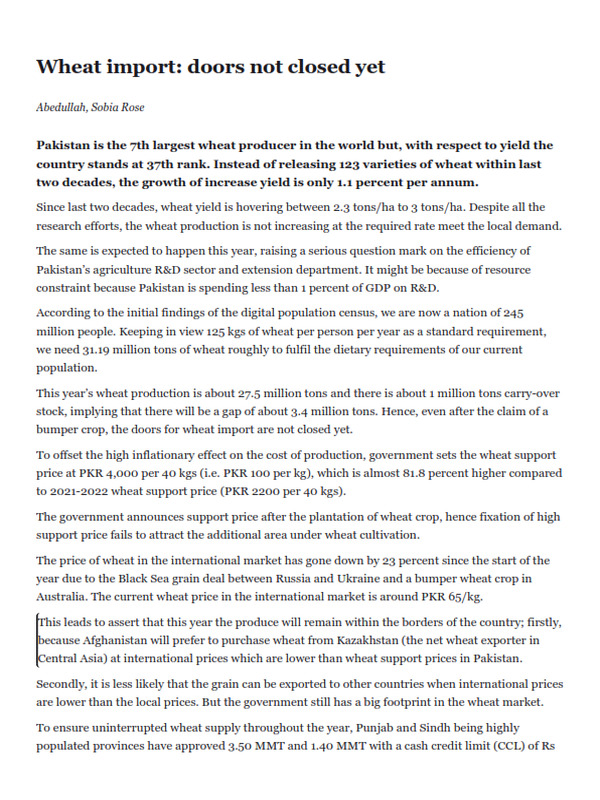Wheat import: doors not closed yet
Pakistan is the 7th largest wheat producer in the world but, with respect to yield the country stands at 37th rank. Instead of releasing 123 varieties of wheat within last two decades, the growth of increase yield is only 1.1 percent per annum.
Since last two decades, wheat yield is hovering between 2.3 tons/ha to 3 tons/ha. Despite all the research efforts, the wheat production is not increasing at the required rate meet the local demand.
The same is expected to happen this year, raising a serious question mark on the efficiency of Pakistan’s agriculture R&D sector and extension department. It might be because of resource constraint because Pakistan is spending less than 1 percent of GDP on R&D.
According to the initial findings of the digital population census, we are now a nation of 245 million people. Keeping in view 125 kgs of wheat per person per year as a standard requirement, we need 31.19 million tons of wheat roughly to fulfil the dietary requirements of our current population.
This year’s wheat production is about 27.5 million tons and there is about 1 million tons carry-over stock, implying that there will be a gap of about 3.4 million tons. Hence, even after the claim of a bumper crop, the doors for wheat import are not closed yet.
To offset the high inflationary effect on the cost of production, government sets the wheat support price at PKR 4,000 per 40 kgs (i.e. PKR 100 per kg), which is almost 81.8 percent higher compared to 2021-2022 wheat support price (PKR 2200 per 40 kgs).
The government announces support price after the plantation of wheat crop, hence fixation of high support price fails to attract the additional area under wheat cultivation.
The price of wheat in the international market has gone down by 23 percent since the start of the year due to the Black Sea grain deal between Russia and Ukraine and a bumper wheat crop in Australia. The current wheat price in the international market is around PKR 65/kg.
This leads to assert that this year the produce will remain within the borders of the country; firstly, because Afghanistan will prefer to purchase wheat from Kazakhstan (the net wheat exporter in Central Asia) at international prices which are lower than wheat support prices in Pakistan.
Secondly, it is less likely that the grain can be exported to other countries when international prices are lower than the local prices. But the government still has a big footprint in the wheat market.
To ensure uninterrupted wheat supply throughout the year, Punjab and Sindh being highly populated provinces have approved 3.50 MMT and 1.40 MMT with a cash credit limit (CCL) of Rs 950 billion and Rs 214 billion, respectively, from the State Bank of Pakistan to purchase wheat from farmers so that Pakistan Agricultural Storage & Services Corporation Limited (PASSCO) can play pivotal role to maintain the low wheat prices in the country.
Although, recent past years’ experience clearly demonstrates that PASSCO failed to maintain the low wheat prices in the country.
Private sector is offering higher prices to the farmer (PKR 5000 per mound) than PASSCO and therefore, it is likely to happen that PASSCO will fail to achieve the targets of wheat procurement. It is announced by government that wheat hoarding by farmers and private sector will be dealt with strictly. This is restricting the role of private sector in the wheat marketing system.
To tackle the wheat shortage, the Sindh government has announced slightly higher wheat prices than Punjab, which is close to the prices that private sector offers to the farmers in Punjab. Hence, as precautionary measures, the Punjab government has sealed its borders for any kind of export, i.e., both national and international.
PASSCO exists as a major player in the wheat supply to the flour mills, discouraging the private sector to engage in wheat marketing.
As a monopolist, PASSCO provides wheat to flour mills at a predetermined price, but flour mills coordinate with the retailers and exploit consumers to earn extra profit. Wheat prices in Pakistan have increased by more than 33% over worldwide rates as a result of Pakistan’s ineffective marketing system, which is a blatant example of a failed marketing plan.
If the major share of marketable surplus of wheat will be in the hands of private sector, then different suppliers in the private sector will compete with each other and will supply wheat to the flour mills at the compatible market price. Under this competing market situation, the consumer prices might not be less than under the situation when PASSCO is the primary supplier of wheat to the flour mills.
Private sector can be given a set price range and government can declare that wheat import will be allowed, for instance, if prices increased more than 30 percent from the international market to limit the profit of private sector.
By doing this, the government can save a huge amount of Rs 200 billion per annum in terms of loan paid to the banks on borrowed money by PASSCO, the cost of wheat loss taking place during the storage, and salaries of administrative staff of PASSCO. If we use the opportunity cost of infrastructure (buildings, etc.) under PASSCO, then this cost will be significantly higher. If the above said cost is diverted towards R & D in a targeted manner on a sustainable basis, there will be a meaningful reduction in prices for consumers in the long run.
(The writers are respectively, Chief of Research and Research Fellow at Pakistan Institute of Development Economics (PIDE))
Copyright Business Recorder, 2023




